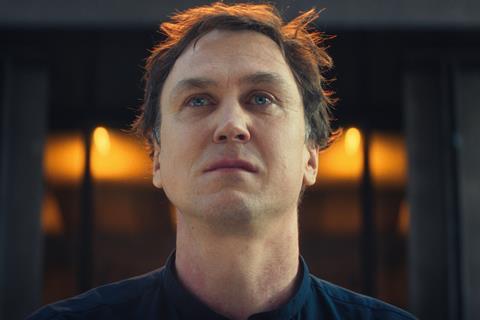Three estranged family members reconnect in Matthias Glasner’s surprisingly life-affirming melodrama

Dir/scr: Matthias Glasner. Germany. 2024. 180mins
As much about the mess of life as about life’s end, Dying – which tells the stories of three members of the same family in overlapping timescales – is a surprising, shape-shifting modern melodrama held aloft by a string of fine performances. It is given added emotional ballast by a specially-composed orchestral piece, whose troubled rehearsal and performance history becomes the story’s existential soul.
Matthias Glasner’s most impressive work to date
One of the biggest surprises is that a film of over three hours that deals, among other topics, with cancer, dementia, self-hatred, depression and suicide can be so oddly absorbing. Writer-director Glasner’s control of tone in a potential misery fest that – believe it or not – contains a bunch of laugh-out-loud moments is pitch perfect, most of the time.
Glasner returns to Berlinale competition, where he screened his tough 2006 drama The Free Will and his 2012 feature Mercy. He has also helmed multiple TV projects in the years since, which may perhaps have inspired the looser, more rangy and appealing story structure of Dying. Right from its title, Dying was always going to be a hard sell but, if carefully handled, it could well generate some arthouse heat.
German actor Lars Eidinger has one of those faces that is like a whiteboard primed for emotional doodles. He makes the most of it in his role as Tom, an orchestra conductor whose life is in a frustrating limbo that – like the experiences of most people in Dying – is not exactly his fault, but not really anyone else’s either. He’s the second of the three Lunies family members to get a chapter all of his own in the film’s first couple of hours. The first is his ailing mother, Lissy (Corinna Harfouch), the third his screw-up of a sister Ellen (Lilith Stangenberg); a dentist’s assistant who uses alcohol, in excess, to medicate her rock-bottom self-esteem.
Glasner makes it clear that he is going to take no hostages in the opening scene, which sees a confused Lissy waking up on the floor of her apartment after soiling herself. Her dementia-afflicted husband Gert (a moving turn from veteran Hans-Uwe Bauer) has taken to walking into the neighbour’s without his underpants on. Life can’t go on like this but go on it must, even when Lizzy suffers a minor heart attack and Gert is taken into respite care. Where are the couple’s two adult kids while all this is happening?
The next two sections fill us in on hints dropped in part one. Tom is in Berlin, rehearsing a new piece called ‘Dying’ composed by his depressive friend Bernard (Robert Gwisdeck). Tom has just become a dad – except he hasn’t really because he’s not the child’s biological father, and formally split up with the baby’s mother Liv (Anna Bederke) several years before, though they never quite disentangled. When Liv calls him as she goes into labour however, Tom is more than happy to step into the paternal role. And we learn plenty about Ellen in the very first scene of her chapter, when, waking up in a strange hotel room in a drunken stupor – not for the first time, we guess – she rings down to reception to discover that she’s in Latvia.
Chucking a comedic depth charge into a lake of suffering is not just a technique in Dying; it feels more like a strategy for living. Tonal suppleness is at its most extreme in the film’s standout scene, a long conversation between Tom and his mother that passes from bathos to devastating emotional laceration and back again, bouyed by Harfouch’s bravura performance. A close second is a later scene worthy of Ruben Ostlund, in which Ellen’s escalating coughing fit ruins the long-awaited premier of Tom’s composition ‘Dying’, mortifying her brother and making the highly-strung Bernard explode.
In Dying, Glasner’s most impressive work to date, people get in the way of other people but still they can’t do without each other; any more than the cancer-riddled Lissy, whose sight is failing, can do without the eyes of her husband on their drive home from the shops. When a character finally does not stand in the way of another at the end of this bright, somber human comedy, the decision seems momentous. And possibly also wrong.
Production companies: Port au Prince Film & Kultur Produktion, Schwarzweiss Filmproduktion, Senator Film Produktion
International sales: The Match Factory info@matchfactory.de
Producers: Jan Krüger, Ulf Israel, Matthias Glasner
Cinematography: Jakub Bejnarowicz
Production design: Tamo Kunz
Editing: Heike Gnida
Music: Lorenz Dangel
Main cast: Lars Eidinger, Corinna Harfouch, Lilith Stangenberg, Ronald Zehrfeld, Robert Gwisdek







![The Brightest SunScreen[Courtesy HKIFF]](https://d1nslcd7m2225b.cloudfront.net/Pictures/274x183/3/5/0/1448350_thebrightestsunscreencourtesyhkiff_312678.jpg)














![The Brightest SunScreen[Courtesy HKIFF]](https://d1nslcd7m2225b.cloudfront.net/Pictures/100x67/3/5/0/1448350_thebrightestsunscreencourtesyhkiff_312678.jpg)

